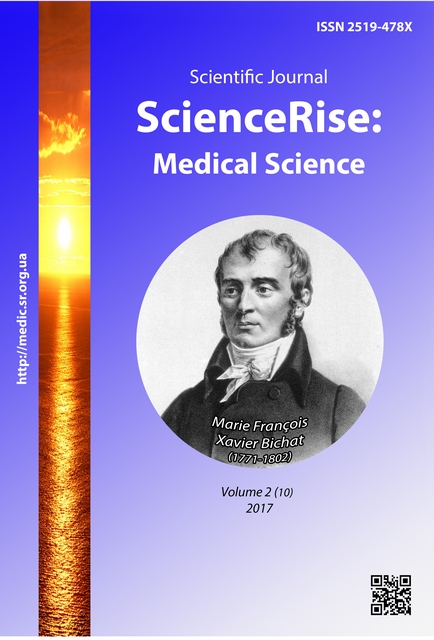Analysis of the reasons for the lack of adherence to treatment and methods of their correction in patients with resistant and pseudoresistant arterial hypertension in family doctor practice
DOI:
https://doi.org/10.15587/2519-4798.2017.93853Keywords:
resistant hypertension, pseudoresistant hypertension, reasons for poor adherence to treatmentAbstract
Aim. The analysis of the main reasons for the lack of adherence to treatment in patients with resistant and pseudoresistant arterial hypertension and the possibilities of their elimination by different poor adherence correction methods against the background of antihypertensive therapy optimization in family doctor practice.
Methods. Questionnaires and surveys, physical examination, office blood pressure measurement, ECG. Retrospective examination of 120 patients with resistant essential hypertension lasting more than 3 years was carried out. First and foremost, in all patients, a new method for differential diagnostics of resistant and pseudoresistant arterial hypertension by office blood pressure measurement and ECG 3 hours before and after previously assigned three antihypertensive drugs administration was used. According to the differential diagnostics results, the patients were divided into 4 groups: 30 patients with pseudoresistant arterial hypertension and 30 patients with resistant hypertension, having common methods for poor adherence to treatment correction, and 30 patients with pseudoresistant arterial hypertension and 30 patients with resistant hypertension, having additional methods for poor adherence to treatment correction.
Results. In most both pseudoresistant and resistant hypertension patients, adherence to treatment violations were found.
Conclusion. On the basis of comparative study of different methods for the lack of adherence to treatment correction in patients with resistant and pseudoresistant hypertension, the efficiency of the additional correction methods was scientifically proved, namely: implementation into the patients’ practice of blood pressure home monitoring with keeping a self-control diary and telephone consultation (visits) method, in elimination of subjective reasons, mostly related to irregular intake of remedies in most patients
References
- Arterial'na hipertenziya. Onovlena ta adaptovana klinichna nastanova, zasnovana na dokazakh (2012). MOZ Ukrayiny, No. 384, 64. Available at: http://www.apteka.ua/article/151151
- Mancia, G., Fagard, R., Narkiewicz, K., Redon, J., Zanchetti, A., Bohm, M. et. al. (2013). 2013 ESH/ESC Guidelines for the management of arterial hypertension. Journal of Hypertension, 31 (7), 1281–1357. doi: 10.1097/01.hjh.0000431740.32696.cc
- Korzh, A. N. (2015). Dyahnostyka y lechenye rezystentnoy arteryal'noy hypertenzyy. Mezhdunarodnyiy meditsinskiy zhurnal, 2, 15–23.
- Kobalova, Zh. D., Shavarova, E. K. (2013). Rezistentnaya arterialnaya gipertoniya: novoe i neizmenno znachimoe. Serdtse: zhurnal dlya praktikuyuschih vrachey, 12 (2), 123–132.
- Yaxley, J., Thambar, S. (2015). Resistant hypertension: An approach to management in primary care. Journal of Family Medicine and Primary Care, 4 (2), 193–199. doi: 10.4103/2249-4863.154630
- Obertyns'ka, O. H. (2015). Rezystentna arterial'na hipertenziya: poshuk optymal'noyi kombinovanoyi terapiyi. Ukrayins'kyy kardiolohichnyy zhurnal, 6, 113–123.
- Wuerzner, K., Hassler, C., Burnier, M. (2003). Difficult blood pressure control: watch out for non-compliance! Nephrology Dialysis Transplantation, 18 (10), 1969–1973. doi: 10.1093/ndt/gfg281
- Gosmanova, E. O., Kovesdy, C. P. (2014). Adherence to antihypertensive medications: is prescribing the right pill enough? Nephrology Dialysis Transplantation, 30 (10), 1649–1656. doi: 10.1093/ndt/gfu330
- Kachan, I. S. (2012). Otsinka prykhyl'nosti do likuvannya khvorykh na hipertonichnu khvorobu. Zaporozhskyy medytsynskyy zhurnal, 1, 70–72.
- Osterberg, L., Blaschke, T. (2005). Adherence to Medication. New England Journal of Medicine, 353 (5), 487–497. doi: 10.1056/nejmra050100
- Burnier, M. (2014). Managing “resistance”. Current Opinion in Nephrology and Hypertension, 23 (5), 439–443. doi: 10.1097/mnh.0000000000000045
- Sirenko, Yu. M., Rekovets, V. M., Hur’yeva, O. S. (2010). Dodatkovi metody otsinky efektyvnosti ta adekvatnosti antyhipertenzyvnoyi terapiyi. Arterialnaya gipertenziya, 2 (10), 40–45.
- Voloshyna, O. B., Udovytsya, V. O., Lysyy, I. S., Dukova, O. R., Chayka, A. O., Dychko, T. O. (2016). Pat. No. 110884 UA. Sposib dyferentsiynoyi diahnostyky psevdorezystentnoyi arterial'noyi hipertenziyi vid rezystentnoyi arterial'noyi hipertenziyi. MPK A61B 5/0452 MPK, A61B 5/021. No. a201410369; declareted: 22.09.2014; published: 25.02.2016, Bul. No. 4.
- Morisky, D. E., Ang, A., Krousel-Wood, M., Ward, H. J. (2008). Predictive Validity of a Medication Adherence Measure in an Outpatient Setting. The Journal of Clinical Hypertension, 10 (5), 348–354. doi: 10.1111/j.1751-7176.2008.07572.x
- Morisky, D. E., Green, L. W., Levine, D. M. (1986). Concurrent and Predictive Validity of a Self-reported Measure of Medication Adherence. Medical Care, 24 (1), 67–74. doi: 10.1097/00005650-198601000-00007
Downloads
Published
How to Cite
Issue
Section
License
Copyright (c) 2017 Вікторія Олегівна Збітнєва, Світлана Валентинівна Бусел

This work is licensed under a Creative Commons Attribution 4.0 International License.
Our journal abides by the Creative Commons CC BY copyright rights and permissions for open access journals.
Authors, who are published in this journal, agree to the following conditions:
1. The authors reserve the right to authorship of the work and pass the first publication right of this work to the journal under the terms of a Creative Commons CC BY, which allows others to freely distribute the published research with the obligatory reference to the authors of the original work and the first publication of the work in this journal.
2. The authors have the right to conclude separate supplement agreements that relate to non-exclusive work distribution in the form in which it has been published by the journal (for example, to upload the work to the online storage of the journal or publish it as part of a monograph), provided that the reference to the first publication of the work in this journal is included.









